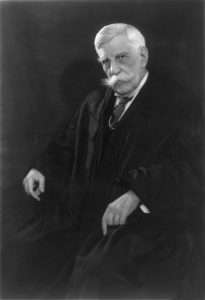The Volokh Conspiracy
Mostly law professors | Sometimes contrarian | Often libertarian | Always independent
Today in Supreme Court History: January 12, 1932
1/12/1932: Justice Oliver Wendell Holmes resigns from the Supreme Court.

Editor's Note: We invite comments and request that they be civil and on-topic. We do not moderate or assume any responsibility for comments, which are owned by the readers who post them. Comments do not represent the views of Reason.com or Reason Foundation. We reserve the right to delete any comment for any reason at any time. Comments may only be edited within 5 minutes of posting. Report abuses.
Please to post comments


Civil War veteran
Yes. Blew right past his father (the celebrated poet and physician) when he visited him in the field to compliment him for enlisting. A complicated relationship.
Isn't there also a narrative of when he was wounded and his father went down looking for him?
Yes.
https://www.theatlantic.com/magazine/archive/1862/12/my-hunt-after-the-captain/308750/
That might be the incident I was thinking of.
Holmes catches a lot of flak for Buck v. Bell. Never mind that the decision was 8-1, my question for conservative originalists who condemn the decision is, what part of the text of the Constitution did the decision fail to see correctly? In other words, which part of the Constitution would bar a state policy of forced sterilization?
I think he catches much more flak for the opinion he wrote than he does for the result.
There's all sorts of cases where the Court has denied substantive due process claims where the facts were heartbreaking. DaShaney v. Winnebago County. Washington v. Glucksberg. Etc. And yet the authors of these opinions, while they may sometimes get criticized, don't get excoriated like Holmes did. Because they didn't say "three generations of imbeciles is enough".
Had Holmes wrote an opinion that expressed sympathy for Carrie Buck, made clear that the sterilization policy was problematic, but argued that due to slippery slope or federalism concerns the Court could not grant her relief, the case would likely have been forgotten. Instead, he not only endorsed eugenics but did so in the crudest possible way.
Indeed.
Fair point, yet again, all the justices but one signed on to it
Yeah, but it is so clearly his voice.
And also, I think it's important to understand that the Court (I think correctly) had far less separate opinions back in those days. (See Buck itself, where Justice Butler dissents without opinion, practically unheard of in a merits case nowadays.) They assigned the opinion, the person wrote it, and everyone signed on. They didn't do the idiotic stuff that Justice Scalia reveled in- "I join all but the first eight words of footnote 12".
So it really was up to Holmes whether he was going to write a reasonable opinion or an unreasonable one. He chose the latter, and took the risk. (See Lamson v. American Ax and Tool Co.).
I would have thought a privilege/immunity of American citizenship (Amendment 14(1)) was not being mutilated except as punishment for a crime.
Under stare decisis that wouldn't have been available to Holmes.
You posed a "question for conservative originalists" - which I may or may not be, it's still in flux, but I can imagine an originalist argument (which would perhaps mean setting aside stare decisis, but you didn't ask about that).
To my knowledge, Holmes was never wrong, even in retrospective, applying modern views.
See above.